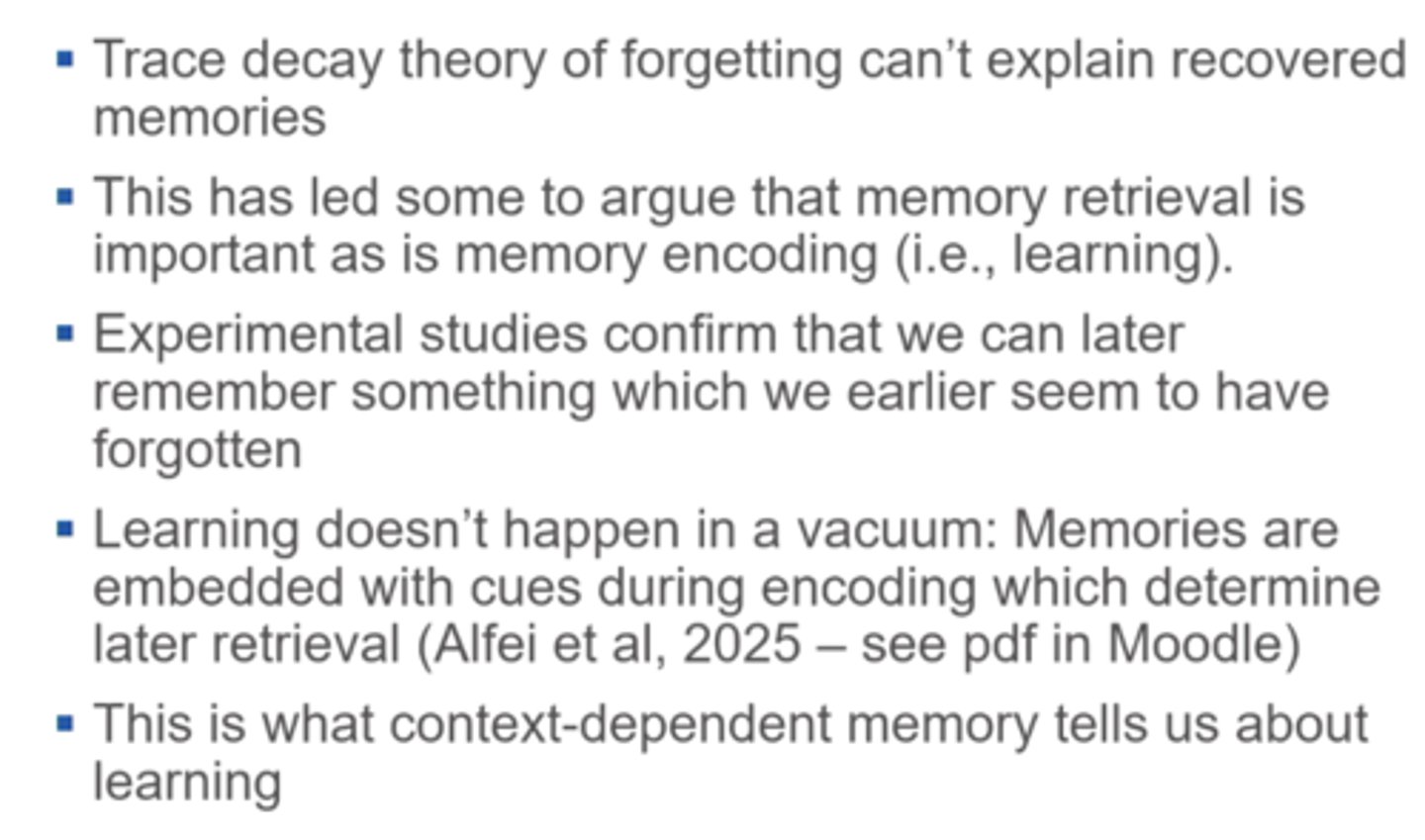Memory retrieval 2 - L14
1/24
There's no tags or description
Looks like no tags are added yet.
Name | Mastery | Learn | Test | Matching | Spaced | Call with Kai |
|---|
No analytics yet
Send a link to your students to track their progress
25 Terms
how did (Bower et al 1978) investigate mood as an internal state influence memory?
They used hypnosis to induce either a mood of Happiness of sadness in their participants
- they learnt 2 lists one following H induction and one following S
- Tested on both lists.
What did Bower et al (1978) find?
Participants recalled information from memory better when their test mood matches their recall mood. better than when mood state was different.
What type of memory best describes Bower et al's (1978) findings?
(internal) State-dependent memory
What is mood?
A temporary, but relatively sustained and pervasive affective state (good/bad) which often contrasts with a more specific emotion.
What is state-dependent memory by alcohol/drugs?
information that was learnt during an intoxicated state is recalled best whilst intoxicated again at test.

What did Overton (1964) study?
- Rats were trained in a T-maze where they would receive an unavoidable shock in one arm of the maze.
- Drug Condition: Some rats were trained under the influence of a drug (typically a sedative or depressant like pentobarbital), while others were trained drug-free.
- Later, the rats were tested either in the same drug state or a different one.
What did overton (1964) find?
state-dependent learning
Rats only avoided the shock effectively when they were tested in the same internal state (drugged or undrugged) as during training.
- acting as a retrieval cue
- The rat's memory for the shock and how to avoid it was tied to the physiological state it was in during training.
Is Extinction context dependent when relying on internal states? who studied this?
Bouton et al (1990)
What did Bouton et al (1990) do?
- CS > shock
- CS > no shock (extinction): EITHER;
- Gave rats benzodiazepine (midazolam)
- no drug
- then tested the rats for fear responses in same state as extinction of in different state.
Bouton et al (1990) findings - When rats were in the same drug state?
Extinction can be state dependent.
- during both extinction and testing, they showed less fear—suggesting successful retrieval of extinction learning.
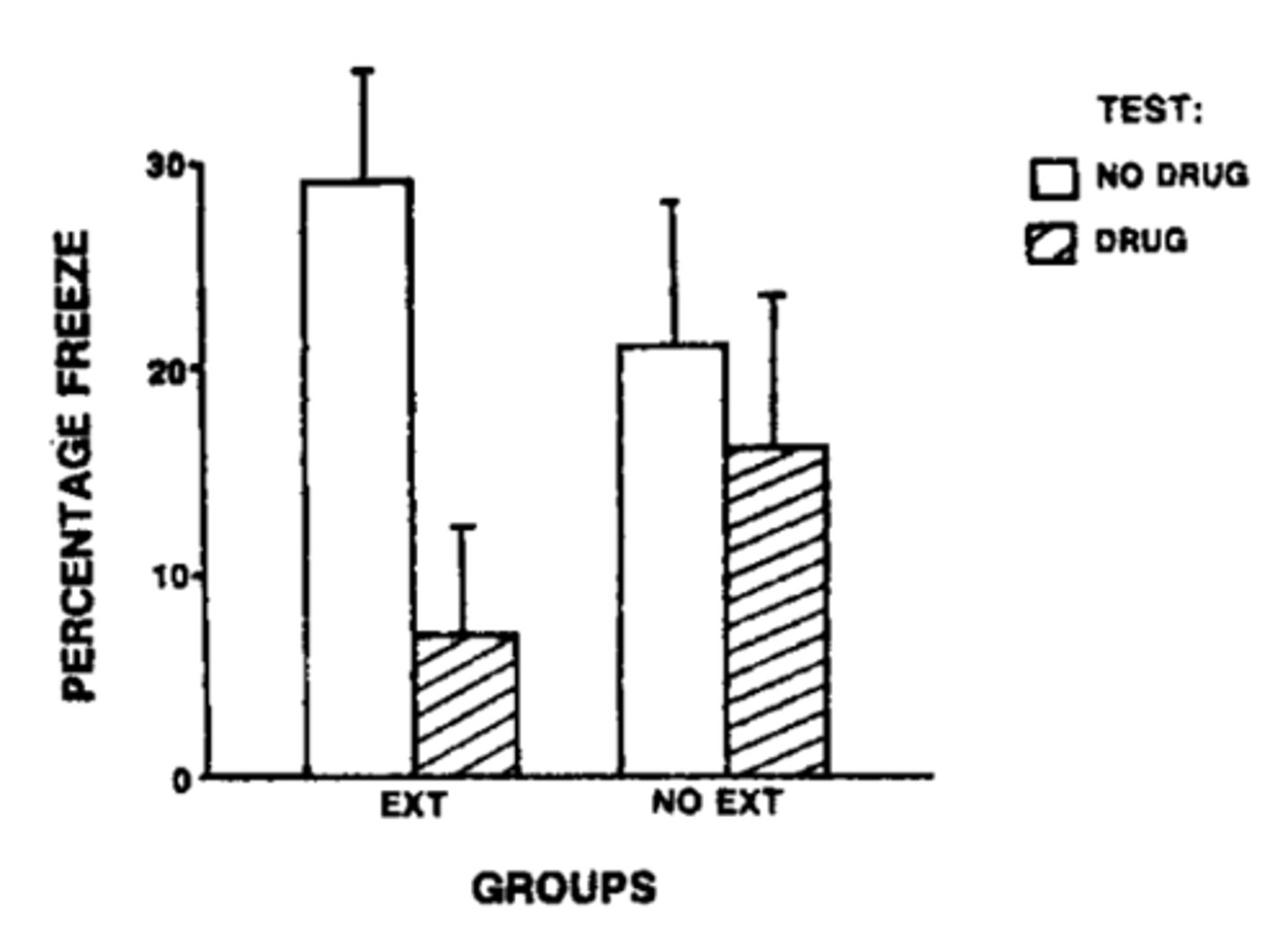
Bouton et al (1990) findings - When rats were in a different state?
Extinction didn't transfer across states
extinguished on drug but tested off it), fear returned—indicating a failure to retrieve the extinction memory.
Who studied state dependence due to intracerebral inactivation?
Ramanathan et al., 2018
How did Ramanathan et al., 2018 induce a state of fear in rats?
inactivated the Nucelus reuniens in the thalamus (RE)
- used a micro-injector to infuse a GABA agonist into this area to produce an inhibition of fear.
- then gave saline or a GABA agonist (Muscimol) into the RE against during training of fear conditioning.
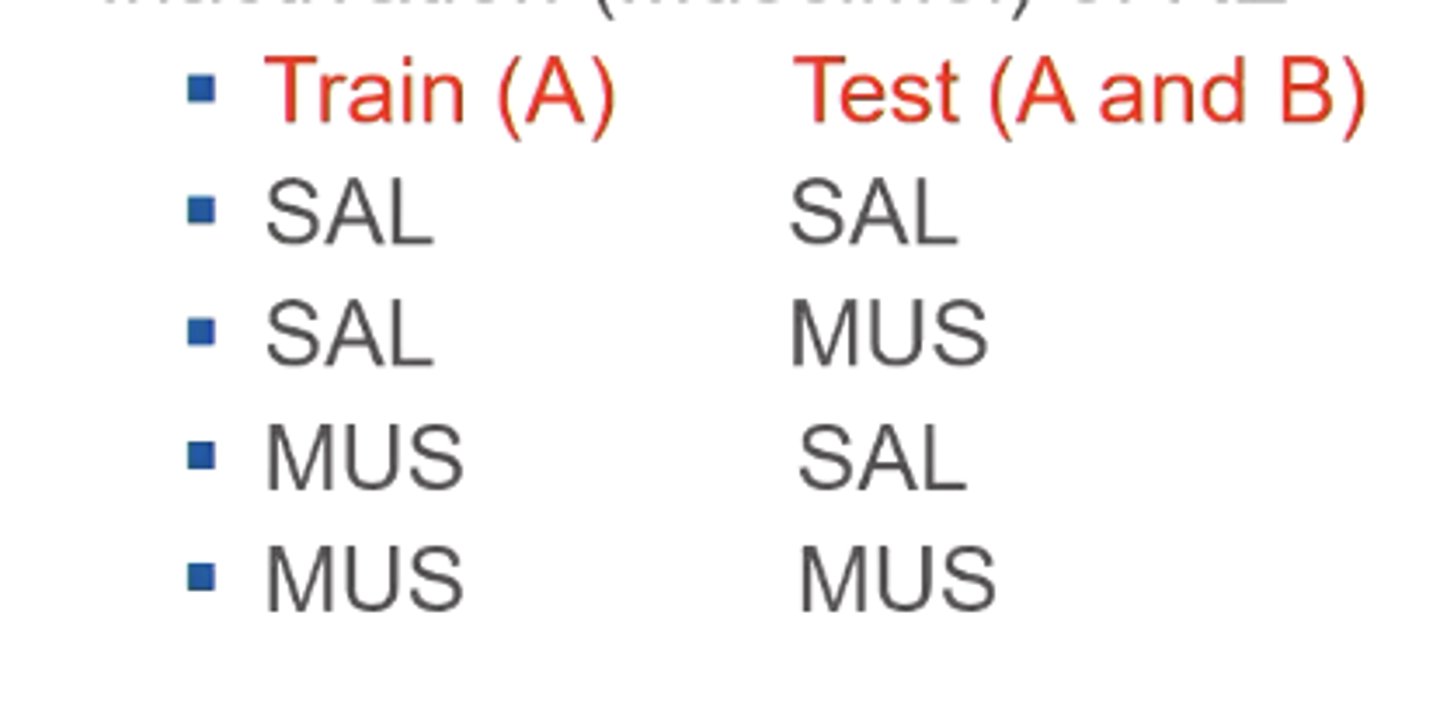
Findings Ramanathan et al., 2018 how did rats perform?
The drug given just before the test and also taken during training recovered the impairment.
- state dependent phenomena as depended upon what happened during training. even in a selective particular region of the brain.
How did Goodwin et al (1969) show state dependence in humans?
- (non-alcoholic) subjects can't remember, when sober, what happened when drunk. May remember when next drunk
How did Eich et al (1975) show state dependence in humans?
Using marijuana to induce state dependent memory and then testing recall at sober/same states
Eich et al (1975) findings?
Cued recall was much better than free recall when participants were intoxicated with marijuana and when only in placebo state (produced a state-dependent effect).
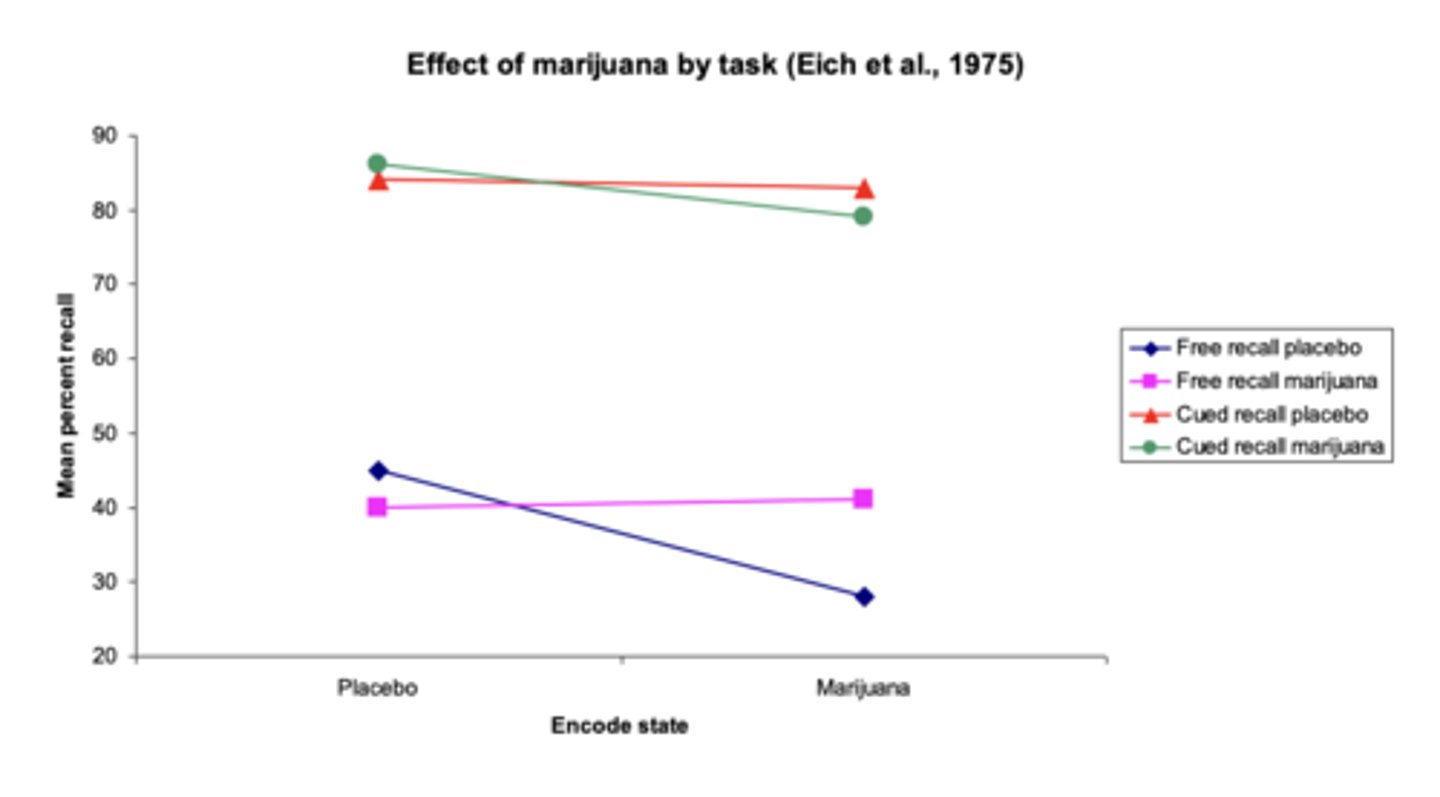
What effect did Carter & Cassaday (1998) find on antihistamines?
a state dependent effect - if they gave the drug during training and then during recall = good performance
- less performance when these are crossed over (2 types of drugs)
Critiquing state-dependency. What did Eich et al's (1980) meta analysis find?
Roughly half of the 57 studies did not get a state dependent effect... why? what results in this effect or not?
What could explain the findings of Eich et al's (1980) meta analysis
The effect of whether additional retrieval cues were used (cued recall)
- some studies used free recall
- some studies used cued recall
Does the level of processing influence state-dependent recall?
No - state dependent effect regardless of shallow or deep processing
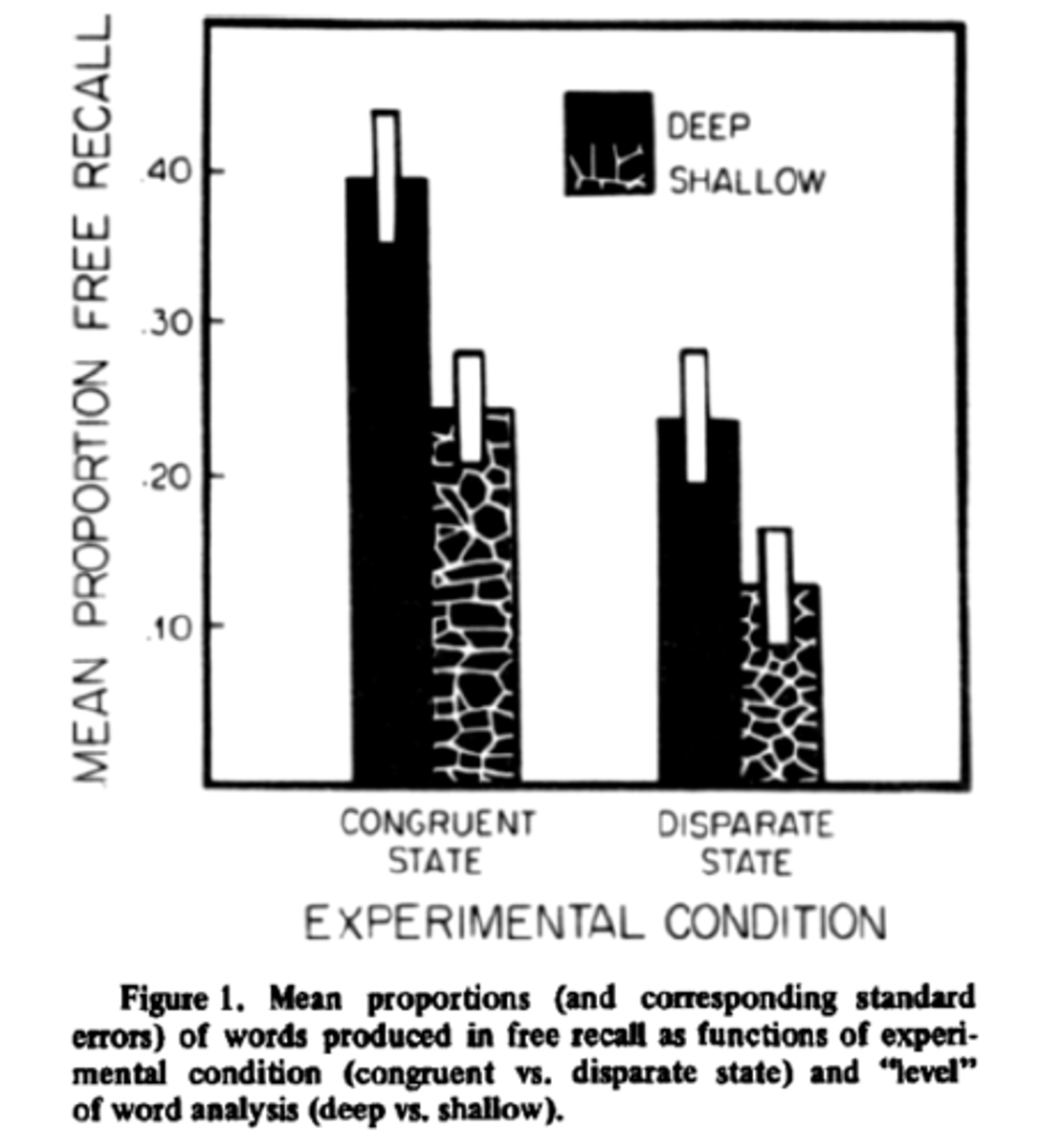
Does the number of retrieval cues at time of test influence state-dependent recall?
yes - when cued recall was used - the state did not matter/influence retrieval - washes away effect of state
- when no cues were given during test - performance goes down (free recall)
What is the effect called that Eich (1980) used to explain the findings in his meta-analysis?
"outshining effect"
What do findings from the meta- analysis suggest? (Eich et al's 1980)
- State-dependent effects consistent and reproducible only when contextual cues are not “outshined” by more explicit reminders
- no cued recall allowed!!
recommended reading
- John M Pearce, Animal Learning and Cognition (electronic version available through library). CHAPTER 9
- Mark E. Bouton, Learning and Behavior: A Contemporary Synthesis. (First or second editions). First part of CHAPTER 5 (up to "The modulation of behaviour")
